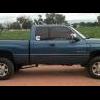- Replies 12
- Views 4k
- Created
- Last Reply
Top Posters In This Topic
-
Mopar1973Man 5 posts
-
NightHawk 3 posts
-
TFaoro 2 posts
-
Killer223 1 post
Most Popular Posts
-
If it's fully deleted go ahead and run 2 stroke. If it's not I wouldn't want to risk plugging emissions equipment. Like Mike said, if your fuel is questionable run the white bottle power service.
-
With the 2009 I wouldn't suggest any additives. Maybe anti-gel if your fuel is questionable if not then I would skip on the additives. Cetane boosters will just decreas
-
If you do use power service you not going to gain much HFRR numbers. I do not suggest mixing 2 cycle and PS. They are mirror products. 2 Cycle Oil is natura



.jpg.6faf1b82511481ed49eb74810b772c80.thumb.jpg.375710f140d09e5d6efe01c939c78654.jpg)

What would be recommended in running for a 2009 6.7 with 112,000 miles or should I not worry about running any addictives in the diesel I did run 2 cycle oil in my 1999 24 valve but I'm new to the cp3 pump and also the 6.7